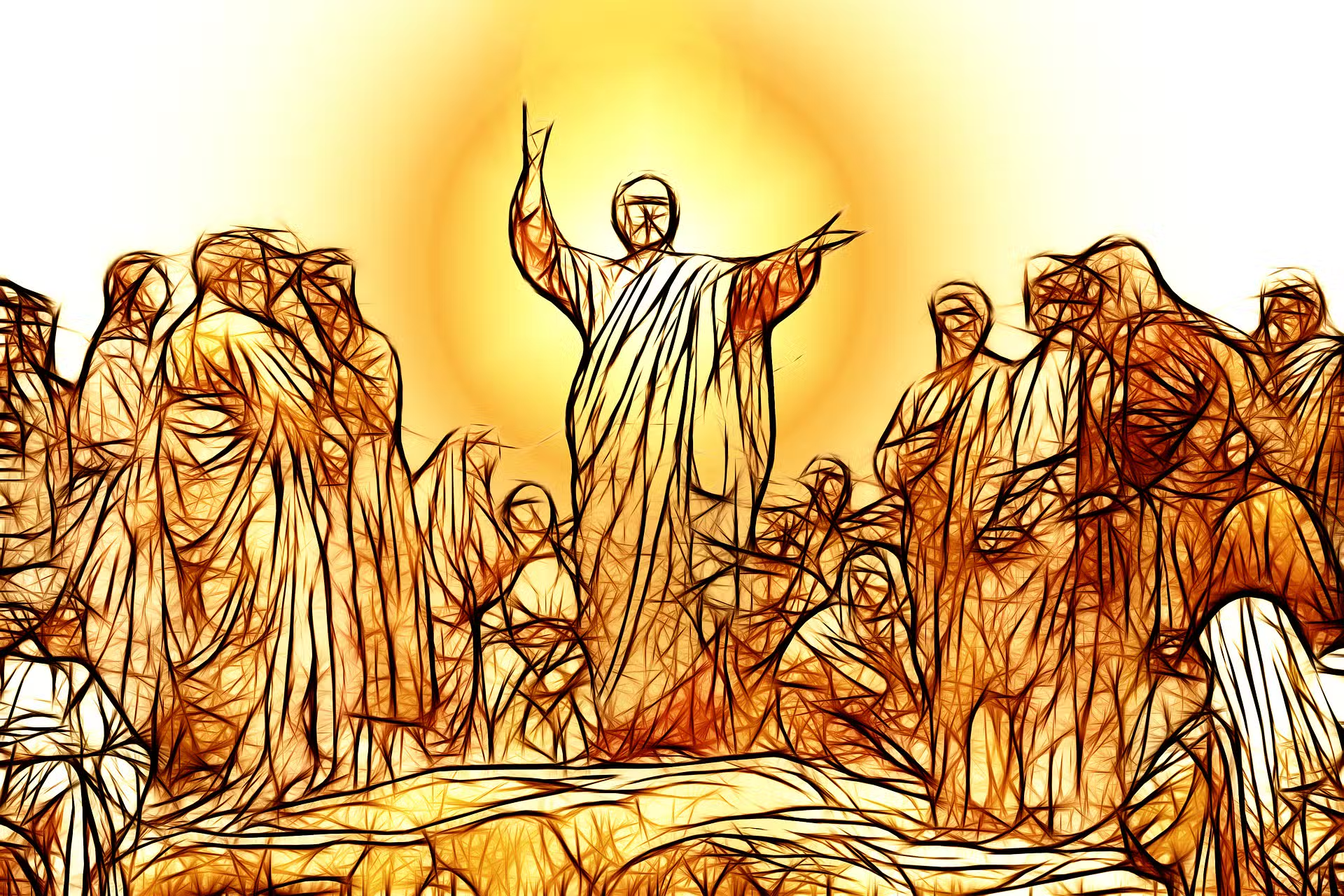Prodigal son, forgiving father, resentful brother: there is something here for each of us.
Jesus is a storyteller—a master storyteller.
But the stories he shares are not the kind we are used to hearing. Jesus uses parables, a form not often told in Western cultures. We’re accustomed to stories that have a beginning, a middle, and an end “happily ever after, ” if possible. A parable, on the other hand, sets the scene, continues with an odd detail here and a subtle hint there, and, just when we expect it to end it doesn’t. It leaves us hanging waiting, hoping, wondering. Parables are meant to throw us off-kilter, to make us wonder “if, ” to call us to conversion.
Most of us have heard the parable of the prodigal son, also known as the prodigal father, the merciful father, the lost son(s). Each title reveals something about the story. But these titles focus on the middle of the story. When it comes to parables, the beginning and the end are the places of power and deepest insight.
The prodigal son is the third story in a triad that focuses on God’s concern for those who are lost. It follows the parables of the lost sheep and the lost coin. The beginning of Luke’s narrative provides a context for understanding these parables and gives us important insight about the audience for whom the stories are intended.
Luke situates these stories at a feast, a public meal. Jesus celebrates and eats with tax collectors and sinners outcasts and those on the fringe of acceptable religious society. Many would think he shouldn’t be seen with these people, much less share a meal with them. Luke sets the scene:
“The tax collectors and sinners were all drawing near to listen to him, but the Pharisees and scribes began to complain, saying, ‘This man welcomes sinners and eats with them.’ So to them he addressed this parable ” (15:1-3).
The three parables are directed, like an arrow to the heart, to the self-righteous who criticize Jesus’ behavior and his dinner companions, refusing to join them for the meal.
A Familiar Tale
The parable of the prodigal son begins simply, disarmingly so: “A man had two sons. ” This is a story about the father’s relationship with both of them and, more importantly, their relationship with each other. We know from hearing the story so often that both have terrible relationships with their father and are estranged from each other.
As we listen, we tend to decide which son we are like: the one who wants his inheritance now (in effect saying, “I want you dead and gone “) or the one who says, “I’ve slaved for you my whole life, and I have nothing to show for it. “
In the time of Jesus, the elder son would inherit everything from his father. In turn, it was his responsibility to care for the other members of the family, carry on his father’s name, and honor him. Usually, after the initial inheritance, the elder son would give a portion to his siblings.
But the younger son wants his share now! And from the very first action of the father, things start to get strange. Instead of following the tradition of the Jewish community by passing on the full inheritance to the elder, the father splits it in half and gives the younger son an equal share.
Jesus’ listeners would be shocked. What kind of Jew and father is this man? From the onset, the actions of the father are about one thing, which becomes more obvious toward the end of the story: getting his children to realize how much he loves them, and to reconcile with each other.
A Calculated Plan?
We know the gist of the parable. The younger son squanders his share of the inheritance on “a life of dissipation. ” He has cut his ties not only to his father and family, but also to his race, his country, and his God.
Then he falls on hard times, reduced to the lowest level of survival, taking care of swine. He’s so hungry, he wants to eat the pig slop, but nobody offers him any.
He finally “comes to his senses. ” We tend to interpret this as repentance, but it is nothing of the sort. It’s a coldly calculated plan to take care of his basic needs. He will return home, “eat humble pie, ” and offer to resume working on the estate to be paid as an ordinary hired hand, nothing more.
This would widen the gulf with his older brother, who has lost half his inheritance and now has to pay his wayward brother while he stays at home.
A Family in Turmoil
When the younger son sold his birthright and inheritance, he betrayed his community, his religion, and his God. On his route back he will have to face his angry neighbors and other Jews. They will probably throw dung and garbage at him, if not stones.
The geography of small communities followed the same pattern. The houses were in the heart of the town, then the public areas, marketplaces, the well, synagogue and other buildings, then the outlying fields owned by all the extended families. He would have to work his way back into his father’s house.
This is the reason his father goes out every day to seek his lost son, hoping against hope that he will return. When he does, he will serve as his shield, walking back in with him. He is willing to humiliate himself day after day, hoping the younger son returns.
This action reveals the sorry state in the family. It was the responsibility of the elder son to keep the family together. The older son should have gone after his brother. He has disregarded the first of his duties as elder son/brother, causing his father to be humiliated daily before the whole community.
The Heart of the Story
The younger man returns, but his father is a couple of steps ahead of him. He catches sight of his younger son from afar, is filled with compassion, runs to him, and embraces and kisses him. He orders the servants to quickly bring the finest robe for him, put a ring on his finger and sandals on his feet.
Again, this father breaks family and societal traditions. Typically the elder son would receive these items as part of his inheritance: the robe, the signet ring that bears the seal of the family, and sandals for contact in public with others in the community. The father not only welcomes the younger son back, but also gives him all of the older son’s expected authority and power as the head of the family.
The father’s next words convey the core of the story: “Then let us celebrate with a feast, because this son of mine was dead, and has come to life again; he was lost, and has been found. ” And the celebration begins the gathering of people, the telling of the story, the preparation of the table and food, music, and the entertainment. Phase one of the father’s plan is set in motion.
And now, we see the elder brother’s relationship (or lack of it) with his father and his brother. He’s out in the fields, tending to what’s left of his inheritance. He hears the music, dancing, and celebration and asks a servant what is going on.
In Luke, this servant represents Jesus, the obedient servant of the Father our oldest brother who preaches the good news of forgiveness. “Your brother has returned and your father has slaughtered the fattened calf because he has him back safe and sound. ” The Gospel has been proclaimed!
An Understandable Reaction
Enraged, the older brother refuses to enter the house. Their father goes out again in sight of the townspeople, humbling himself, trying to lure his other son back. One had been lost in the “wilds ” of the world; the other is “lost in his father’s house. “
When his father begs him to join the family and welcome his brother home, the elder son bluntly replies:
“Look, all these years I served you and not once did I disobey your orders; yet you never gave me even a young goat to feast on with my friends. But when your son returns who swallowed up your property with prostitutes, for him you slaughter the fattened calf. “
He sees himself as a slave to his father, and he refuses to acknowledge that the other son is his brother. The father makes it clear that he loves them both: “My son, you are here with me always; everything I have is yours. But now we must celebrate and rejoice, because your brother was dead and has come to life again; he was lost and has been found. ” And the parable ends abruptly.
What Comes Next?
There is a saying among storytellers that “the story begins when the teller stops talking. “
This story can end in a number of ways. The elder brother can come back with his father and embrace his brother, reconciling with him. He can act as if everything is all right and still despise his brother, biding his time to get what remains of his rightful inheritance. Or he can refuse to come in and stay in the field, shaming his father even more.
The younger brother can notice they are both missing and go out and ask forgiveness of his brother. He can send a servant out with a gift, a peace offering, asking him to come in and celebrate. Or he can ignore them both and selfishly think he’s got a good thing going here.
The father can go back in, weep, and send his servant to each of them, begging them to return home (and the servant is beaten or killed by them both). The brothers can both go out and meet halfway. Or, others from the community can try to bring them together, working on the one they know from friendship and life.
This is the intent of the parable. A man had two sons who were both lost, and who refuse to live as brothers, tearing the family and the community apart. To sit together at the table is to forgive and be forgiven, to begin to reconcile and start to live in communion as the beloved sons and daughters of God, who is intent on bringing us all home together.
Our Place in the Story
We are all lost in many ways both in our worlds and in our Abba‘s house when we refuse to live in communion with our brothers and sisters. The parable is about the God in whose image we are made Father, Beloved Child, and Spirit who holds us together as the three who are One. Our relationship with God is only as good as our relationship with one another.
The story can have many names. Perhaps these will open doors of insight and action for us: “The Family Reunion: The Feast Begins! ” Or, “Time for Dinner! Come Home, Children. Come Sit at the Table, and Let’s Eat Together. “
We know in our hearts that at any meal, what’s on the menu isn’t the prime reason we’re there. What’s important is who we break bread with and who we toast with the wine we share.
Jesus’ parable, told at a meal, reminds us that all are invited to the feast. Our God wants us all at home, sitting around the table, rejoicing and dwelling in peace.








